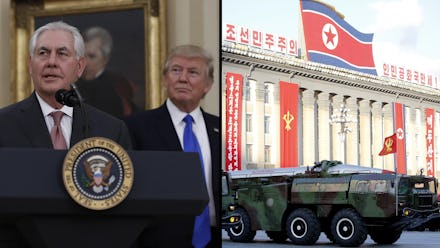Rex Tillerson says US "has spoken enough" after latest North Korean missile launch

President Donald Trump's secretary of state Rex Tillerson issued an ominous statement in response to yet another North Korean missile launch on Wednesday morning Pyongyang Time, writing "North Korea launched yet another intermediate range ballistic missile. The United States has spoken enough about North Korea. We have no further comment."
The statement closely follows a report that an anonymous White House official suggested to CNN that Trump's administration is now considering some form of military response.
"The clock has now run out, and all options are on the table," the official said. The language about "all options" is a standard reference to the willingness to use military force, but such a statement in concert with the clock having run out is new compound threat.
This weekend, Trump told the Financial Times he would pressure Chinese President Xi Jinping at an upcoming meeting to take action on North Korea's missile program, or "we will."
"Well, if China is not going to solve North Korea, we will," Trump said. "That is all I am telling you."
"China has great influence over North Korea," Trump continued. "And China will either decide to help us with North Korea, or they won't. And if they do that it will be very good for China, and if they don't, it won't be good for anyone."
Is Trump bluffing?
The president is likely correct that unilateral action on North Korea "won't be good for anyone." As the New York Times noted in March, air strikes on North Korean military targets could easily fail to stop the country from deploying some of its nuclear arsenal — the full capacities of which are currently unknown. A regional conventional war would be devastating, the Times wrote, as Kim Jong-un "almost certainly" has the capability to use artillery, chemical or nuclear weapons against urban targets in South Korea like Seoul, "potentially killing millions."
But Trump has long indicated he considers autocrat Kim Jong-un a major threat. On the campaign trail, he called the dictator's takeover after predecessor Kim Jong-Il "incredible," warning "we can't play games with him. Because he really does have missiles. And he really does have nukes."
In January, Jeffrey Lewis, a nonproliferation expert at the Middlebury Institute of International Studies at Monterey, wrote in Foreign Policy that "the whole policy debate has been an absurd carnival of panic, bellicosity and partisanship," despite the possibility of stalling North Korean missile tests via diplomatic means. Republicans in Congress have remained hawkish on foreign policy even after the fallout of the United States' last major war in Iraq, and the House recently voted to condemn North Korea over the missile tests.
The upcoming meeting between Trump and the Chinese president may give the opportunity for a more constructive course of action, though as Foreign Policy noted, Trump appears to have an unrealistic view of China's leverage over Kim.
The U.S. has or is in the process of deploying defensive systems including the naval destroyer-mounted Aegis system and the Terminal High Altitude Area Defense System into the region.